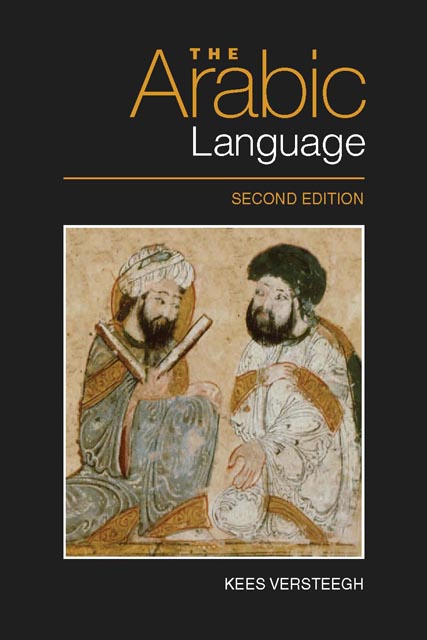Book contents
- Frontmatter
- Contents
- Preface to First Edition
- Preface to Second Edition
- List of Figures and Maps
- List of Tables
- Note on Transcription and Glossing
- 1 The Study of Arabic in the West
- 2 Arabic as a Semitic Language
- 3 The Earliest Stages of Arabic
- 4 Arabic in the Pre-Islamic Period
- 5 The Development of Classical Arabic
- 6 The Structure of Arabic
- 7 The Arabic Linguistic Tradition
- 8 The Emergence of New Arabic
- 9 Middle Arabic
- 10 The Study of the Arabic Dialects
- 11 The Dialects of Arabic
- 12 The Emergence of Modern Standard Arabic
- 13 Diglossia
- 14 Bilingualism
- 15 Arabic as a Minority Language
- 16 Arabic Pidgins and Creoles
- 17 Arabic as a World Language
- Bibliography
- List of Abbreviations
- Index
15 - Arabic as a Minority Language
Published online by Cambridge University Press: 18 November 2022
- Frontmatter
- Contents
- Preface to First Edition
- Preface to Second Edition
- List of Figures and Maps
- List of Tables
- Note on Transcription and Glossing
- 1 The Study of Arabic in the West
- 2 Arabic as a Semitic Language
- 3 The Earliest Stages of Arabic
- 4 Arabic in the Pre-Islamic Period
- 5 The Development of Classical Arabic
- 6 The Structure of Arabic
- 7 The Arabic Linguistic Tradition
- 8 The Emergence of New Arabic
- 9 Middle Arabic
- 10 The Study of the Arabic Dialects
- 11 The Dialects of Arabic
- 12 The Emergence of Modern Standard Arabic
- 13 Diglossia
- 14 Bilingualism
- 15 Arabic as a Minority Language
- 16 Arabic Pidgins and Creoles
- 17 Arabic as a World Language
- Bibliography
- List of Abbreviations
- Index
Summary
Introduction
In the course of history, some speakers of Arabic havebecome isolated from the central area. Living amongpeople who speak a different language and in orderto function in society they have to use the dominantlanguage of their neighbours, while continuing tospeak Arabic among themselves as a home language.Usually, in such linguistic enclaves (called inGerman Sprachinsel)the home language has little prestige, and thespeakers depend on the official language in theireveryday dealings. Because of the frequentcode-switching and the many integrated loans, theirlanguage is subject to all kinds of linguisticpressure from the dominant language (adstratalinfluence). The linguistic enclaves thereforepresent an area of general interest for the study oflanguage contact.
The study of the Arabic linguistic enclaves alsocontributes to our knowledge of the history ofArabic. The classicising influence of the standardlanguage was considerably weaker here than in thecentral empire. In some respects, therefore, thestructure of these dialects reflects an earlier formof spoken Arabic in the areas to which they wereexported without the pressure from the Classicallanguage, which in the core area acted as a targetfor most speakers (cf. above, pp. 146–9). There is,however, no direct correlation between the date ofcut-off and the present structure of these dialects.Hardly any linguistic enclave, with the possibleexception of Maltese, was ever completely isolatedfrom the central area, and in most cases thespeakers maintained some form of contact with theprestigious centres of the Islamic empire, be itonly because of their adherence to Islam.
In this chapter, we shall briefly discuss thelinguistic situation of a number of linguisticenclaves in which Arabic is spoken, and we shallalso deal with the linguistic situation of the manyArab immigrants in Western Europe and America.
Maltese
When in 256/870 the Tunisian Aghlabids conquered theisland of Malta, the inhabitants were Christians whoprobably spoke some kind of Romance dialect. Duringthe period of Muslim domination, the entirepopulation took over the Arabic language. If webelieve the report by the eighth/fourteenthcentury-geographer Muḥammad ibn ʿAbd al-Munʿimal-Ḥimyarī in his Kitāb ar-rawḍal-miʿtār, for some 180 years after theconquest there were no inhabitants at all and theisland was repopulated with Arabic-speaking peopleafterwards (Brincat 1991).
- Type
- Chapter
- Information
- The Arabic Language , pp. 276 - 298Publisher: Edinburgh University PressPrint publication year: 2014



